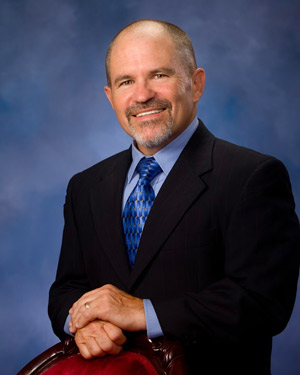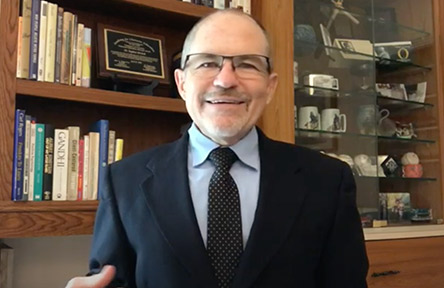
June 17, 2022 — Times have been tough for PEF members the last few years – thousands faced COVID on the job as essential workers or endured the isolation brought on by the pandemic; and now, everyone is adjusting to record-high inflation and returning to work amid still prevalent COVID cases statewide.
“We recognize how important it is to bring us together to talk about wellness, mental health and stress management,” said PEF Vice President Randi DiAntonio during a webinar with Dr. Stephen Birchak, also known as “Dr. Bird,” a leading national speaker in the positive psychology movement.
DiAntonio said Dr. Bird has spoken to PEF members before and “you walk out of a room after a meeting with Dr. Bird feeling like you have a better sense of how to handle things that you have no control over.”
A professor emeritus at the College of St. Rose, Dr. Bird has trained critical mental health providers and has dedicated his life to positive psychology.
“The world is a very challenging place,” he said. “There are so many variables we can’t control. It’s not about changing the environment around us, sometimes we can’t. We have to look at ourselves and what can I do with what I have right now?
“There is no magic wand, but there are things we can do together to be able to help each other through this,” he said. “There is no agency, or administration, or government that can guarantee that life will be normal. Change is the new normal.”
Dr. Bird focused on how we can continue to nurture our positivity, mental health, and coping skills by remembering the power of compassion, connections, and courage.
Compassion
The last two years have been a rollercoaster.
“If you found yourself crying in the last two years, that’s a sign that you are still invested in life,” Dr. Bird said. “If you didn’t feel anything, I would be concerned about you. The three easiest words in English are ‘I don’t care.’ Once we hear those words come out of our mouth, we lose all our power.”
So how do we rebuild ourselves?
“Compassion, connections and courage,” he said.
Self-compassion is the most important place to start. “You can’t give away something you don’t have,” Dr. Bird said. Self-compassion is about loving your best self, he continued. “A lot of people live a life of ‘should’ and then we’re miserable because we can’t like our best self.”
Not only does low self-esteem hurt you, but it also hurts those around you. Low opinion of yourself spreads to your inner circle – and then outward, bringing everyone down with you. Road rage, Facebook rage, Twitter rage: “On the way to work we are thinking of everything that can go bad. When you get there, you have nine stories in your head about how the day is going to go bad.”
Dr. Bird said impatience is immoral.
“There are real crises in the world,” he said. “The pandemic is a real crisis. Guns and murder, these are real crises. 9/11 was a real crisis. Having a loved one die. These are real crises. But long lines at Dunkin’, that’s not a crisis. Who left the dishes in the sink, not a crisis. Not everything is a crisis. Is it a crisis or is it an inconvenience?”
As public employees, PEF members have to be ambassadors of kindness, said Dr. Bird. “If we are not the ones who are trying to make the world a calmer place, then who is?”
Connections
 The right connections, like family, colleagues and loved ones, as opposed to “emotional vampires,” are vital for a positive outlook.
The right connections, like family, colleagues and loved ones, as opposed to “emotional vampires,” are vital for a positive outlook.
“We have seen some horrific things in the news, but I guarantee for every horrific incident, there are thousands of other things that people have done that have been kind and patient and loving,” Dr. Bird said. “People talk about passengers on planes all out of control. I have flown thousands of times and I’ve never seen a fight. I’ve seen somebody help someone with a piece of luggage; help a mother with a stroller; I’ve seen thousands of acts of kindness for every horrific one.
“Have you ever allowed a negative co-worker, rude stranger, negative social media, or negative talk show to alter your positive attitude?” he said. “How will you choose to retain your positivity?”
Dr. Bird said everyone should try to spend time focusing on things they are grateful for or that make them smile each day. Take a break from the cyber world of negativity. After a while, you will start to notice things that are going well instead of dwelling on things that aren’t.
“Rumination can change brain chemistry,” he said. “It can cause anxiety and depression. Is doing what I’m doing getting me what I want?”
Courage
Be courageous even if you aren’t comfortable, he advised. It’s OK to “do it afraid.”
“Fearlessness is overrated,” Dr. Bird said. “If you’re completely fearless, you are dangerous. Having some fear is natural. When we have to do important things in life, we’ve got to do it afraid. You have to let go of being perfect. Do you want to be happily flawed, or perfectly miserable?”
For short inspirational positive change videos (5-7 minutes each), visit Dr. Bird’s YouTube Channel. To connect with Dr. Bird, visit www.docbird.com or email jerkwhisperer@gmail.com.

